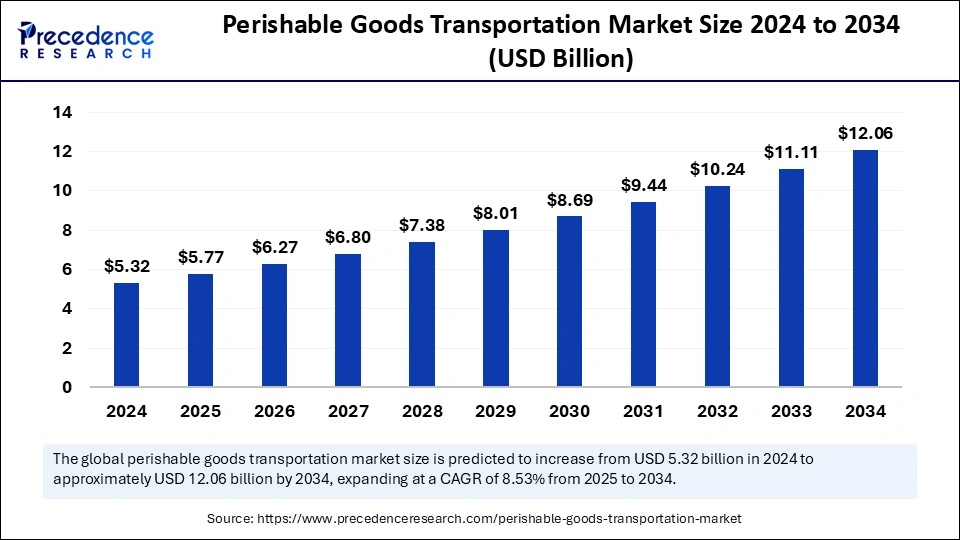Perishable Goods Transportation Market to Hit USD 12.06 Bn by 2034
The perishable goods transportation market is expected to rise from USD 5.32 billion in 2024 to USD 12.06 billion by 2034, With a CAGR of 8.53%.

Perishable Goods Transportation Market Key Takeaways
The perishable goods transportation market was led by North America in 2024.
Asia Pacific is expected to exhibit the highest CAGR over the forecast period.
In terms of type, the MPS segment dominated the market in 2024.
The dairy and frozen desserts segment is forecasted to grow at the quickest CAGR during the forecast timeframe.
Road transportation was the leading mode by market share in 2024.
Air transportation is anticipated to record the fastest growth rate by transportation mode during the projected years.
Perishable Goods Transportation Market Overview
The Perishable Goods Transportation Market is undergoing a major transformation, influenced by shifting consumer habits, technological innovation, and increasing urbanization.
As more consumers demand quick access to fresh produce, dairy, meat, and temperature-sensitive pharmaceuticals, efficient refrigerated transport systems have become a vital part of supply chain operations. This market not only serves supermarkets and hospitals but also supports the growing online grocery and meal kit delivery segments. Cold chain logistics are becoming more integrated and data-driven, enabling companies to meet the high expectations of freshness, safety, and timely delivery.
Perishable Goods Transportation Market Drivers
Urbanization and the rise of dual-income households have fueled the demand for convenience foods and home delivery services. As a result, there is a growing reliance on temperature-controlled transport to ensure that goods arrive fresh. The proliferation of quick-commerce platforms offering 10-30 minute delivery of groceries has further heightened the need for rapid, reliable refrigerated transport solutions.
Government efforts to reduce food waste and improve food safety have also boosted investments in cold chain infrastructure. Additionally, advancements in packaging materials and insulation technology have supported the efficient transport of perishable goods over longer distances.
Perishable Goods Transportation Market Opportunities
The increasing demand for same-day and next-day delivery in urban areas opens new possibilities for micro cold storage hubs and electric refrigerated vans. Retailers and logistics providers are experimenting with drone delivery and autonomous refrigerated vehicles, which may soon become commercially viable.
Integration of AI and big data for demand forecasting and route optimization presents additional value creation. There is also a strong push for localization of cold storage facilities, particularly in emerging markets where access to centralized logistics hubs may be limited. Moreover, leveraging renewable energy sources for cold storage units and trucks offers a sustainable edge.
Increasing adoption of eco-friendly vehicles
The market is increasingly using eco-friendly vehicles, fueled by the need for eco-friendly practices and environmental concerns. Hence, fuel-efficient options such as electric vehicles are gaining traction. Furthermore, the adoption of EVs includes refrigerated trucks, which are gaining popularity as they provide zero-emission transportation and minimize carbon footprints. Major players are also heavily investing in fuel-convenient vehicles to reduce environmental impact.
- In June 2024, Revfin, the digital lending platform for sustainable mobility, announced a collaboration with Kalyani Powertrain Ltd (KPTL), the electric mobility arm of Bharat Forge Ltd, and Bluwheelz, a provider of sustainable logistical solutions. Together, they aim to introduce retrofitted electric trucks to the Indian logistics sector.
Perishable Goods Transportation Market Challenges
The biggest challenges include high fuel and maintenance costs, inconsistent infrastructure, and the shortage of trained personnel to manage cold chain operations effectively. Regulatory compliance is becoming increasingly complex as global standards evolve and governments enforce stricter guidelines.
Equipment failure during transit poses significant risks, as even slight temperature deviations can compromise product quality. Managing logistics for multi-temperature goods and ensuring real-time tracking across all stages of delivery can be resource-intensive and technologically demanding.
Perishable Goods Transportation Market Regional Insights
The United States and Canada dominate the North American market due to high standards in food safety and advanced logistics networks. Europe follows closely, with strong demand in Germany, the UK, and France for perishable imports and processed foods.
The Asia-Pacific region is expanding rapidly, driven by e-commerce, urban population growth, and food exports from countries like India, China, and Thailand. Meanwhile, infrastructure development in Latin America and parts of Africa is enabling gradual improvements in refrigerated transport, particularly for export-focused agricultural sectors.
Perishable Goods Transportation Market Recent Developments
Recent developments include the launch of AI-powered fleet management platforms that optimize vehicle routing and ensure temperature integrity. Electric refrigerated vehicles are gaining popularity, especially in Europe, as companies look to reduce emissions and operating costs. New refrigeration technologies that use phase-change materials and solar energy are entering the market.
Additionally, partnerships between e-commerce platforms and logistics firms are resulting in customized cold chain solutions tailored for last-mile delivery. Data analytics platforms are being widely adopted to monitor real-time shipment conditions and respond proactively to disruptions.
Perishable Goods Transportation Market Companies
- Africa Express Line Limited
- Bay & Bay Transportation
- C.H. Robinson Worldwide Inc
- CMA CGM Group (MERIT France SAS)
- DB Schenker
- Deutsche Post AG
- FST Logistics Inc
- Hapag-Lloyd AG
- Hellmann Worldwide Logistics SE
- K Line Logistics Ltd (Kawasaki Kisen Kaisha Ltd)
Segments Covered in the Report
By Type
- MPS
- Dairy and Frozen Desserts
- Vegetables & Fruits
- Bakery & Confectionery
By Mode of Transportation
- Rail Transportation
- Air Transportation
- Marine Transportation
- Road Transportation
By Geography
- North America
- Europe
- Asia Pacific
- Latin America
- Middle East and Africa
Ready for more? Dive into the full experience on our website!
